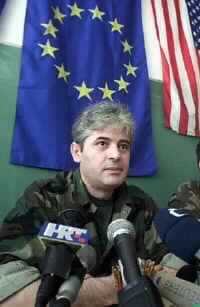SKOPJE (Islamweb & News Agencies) - NATO's commander-in-chief was due in Macedonia on Monday to assess whether a shaky truce was firm enough for the alliance to launch its third mission in the Balkans since the Yugoslav federation fell apart in 1991.U.S. General Joseph Ralston's visit will be brief. But his judgement will be vital to a decision by NATO's 19 member states on whether to deploy 3,500 troops to gather arms from ethnic Albanian fighters who declared on Sunday their uprising for equal rights was over.
``All conditions for the deployment are in place except the cease-fire,'' a Western diplomat said. ``As far as it is concerned, the trend is in the right direction. The question will be how durable that trend is. That will be Ralston's judgement call.''
Residents of Tetovo, the unofficial capital of Macedonia's big Albanian minority and a flashpoint in six months of sporadic conflict, said small arms fire and heavy detonations were audible in eastern suburbs and nearby villages on Sunday night.
But despite brief shootouts almost every day, the truce has solidified since an advance NATO force of 400 troops began flying into Skopje on Friday. Alliance ambassadors are expected to meet in Brussels on Tuesday for a briefing from Ralston.
NATO, which believes a lightning disarmament mission can prevent a fifth Balkan war in a decade, fears being trapped between the front lines it aims to demilitarize. It insists it will not be sucked into an open-ended operation as in Bosnia and Kosovo, where tens of thousands of soldiers keep a flawed peace.
Diplomats were heartened by commitments from the leader of the Albanian National Liberation Army (NLA) to honor his side of the peace bargain and trust the government to enact the reforms to improve Albanian minority rights it promised in return. (Read photo caption).
But they warned it was now time for Ali Ahmeti and the NLA to honor their pledges and prepare to hand over guns to NATO.
``We believe the war is over,'' Ahmeti proclaimed to foreign journalists, invited to the Albanian mountain lair in the remote village of Sipkovica for his first ever news conference.
OBSTACLES
Less encouraging for NATO was the continued blockade of its main supply route to Kosovo by angry members of the Macedonian majority, who blame the alliance for failing to stop guns and fighters flooding into Macedonia from the Yugoslav province.
Other obstacles remain before the peace pact, which requires ratification by a nationalist-dominated parliament, is actually implemented. Many Macedonians want the NLA to surrender its whole arsenal before making the deal more than a piece of paper.Few expect more than a token selection of weapons to be turned in and the rest buried for future use by fighters whose real agenda is widely assumed by Macedonians to be territorial.
Despite the deep ethnic animosity among Macedonia's two million people, there is little appetite for civil war.
But NATO's planned 30-day mission leaves it little leeway to deal with hitches, which could strengthen the hand of Macedonian hard-liners who dismiss the accords as a sellout at gunpoint.
Many Macedonians fear Albanians may provoke fresh fighting once NATO arrives in the hope of forcing it to police existing lines, thus tightening the NLA's grip on northern territory.
One NLA fighter said he hoped NATO, revered by Albanians for the backing it gave their ethnic kin in Kosovo against Serb oppression two years ago, would stay for longer than planned.
Giving only his nom de guerre of Profi, the 38-year-old greying fighter in plain clothes said Macedonian forces had to be prevented from rushing to reoccupy Albanian-held territory.
``If (NATO) do this for one month only, it is better that they do not come at all,'' he said at a roadside cafe in the hillside village of Prsovce. ``Who is going to secure my safety when NATO leaves after such a short time and with my gun?''
PHOTO CAPTION:
The leader of ethnic Albanian fighters in Macedonia, Ali Ahmeti, waits for journalists' questions at his first ever news conference on Macedonian soil, in the mountain village of Sipkovica August 19, 2001. Ahmeti declared the fighters were committed to peace after agreeing to end a six-month armed revolt for equal rights that has dragged the former Yugoslav republic towards civil war. NATO troops are in Macedonia to assess whether a shaky cease-fire in force for a week is stable enough to allow a larger force to be deployed to collect Albanian weapons. (Petr Josek/Reuters)
- Author:
Islamweb & News Agencies - Section:
WORLD HEADLINES


 Home
Home Discover Islam
Discover Islam Quran Recitations
Quran Recitations Lectures
Lectures
 Fatwa
Fatwa Articles
Articles Fiqh
Fiqh E-Books
E-Books Boys & Girls
Boys & Girls  Ramadan
Ramadan Fatwa Audios
Fatwa Audios Month of Mercy
Month of Mercy Women
Women Eed Al- Fitr
Eed Al- Fitr Food Recipes
Food Recipes Videos
Videos

 Prayer Times
Prayer Times












